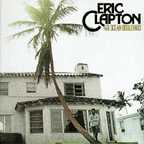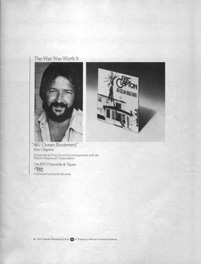![]()
  |

461 Ocean Boulevard
Eric Clapton
RSO SO 4801
Released: July 1974
Chart Peak: #1
Weeks Charted: 25
Certified Gold: 8/8/74
 Between laid-back and listless, between tastefully restrained and the downright niggardly, the line can be periliously thin. Eric Clapton's new album teeters precariously on the very edge, flirting with, but in the nick of time always just skirting, dullness. It's a tribute to Clapton's charisma and talents that 461 Ocean Boulevard doesn't succumb to the danger Clapton courts by playing unobtrusively with an unimpressive band. Still, it's a close call, too close for comfort.
Between laid-back and listless, between tastefully restrained and the downright niggardly, the line can be periliously thin. Eric Clapton's new album teeters precariously on the very edge, flirting with, but in the nick of time always just skirting, dullness. It's a tribute to Clapton's charisma and talents that 461 Ocean Boulevard doesn't succumb to the danger Clapton courts by playing unobtrusively with an unimpressive band. Still, it's a close call, too close for comfort.
461 shies away from the rich sonorities and lyrical, flowing lines that made Clapton an unhappy superstar. So determined is he to break from his past that frequently he plays dobro instead of guitar. 461 debuts a new, thin, circumspect style which will disappoint many -- it has neither the beauty nor the power of the old sound. But rhythmically it constitutes an advance, lending itself more readily to syncopation. With its reggae and touches of Bo Diddley, 461 can swing as Clapton's earlier work did not.
What's disturbing is not that Clapton plays differently, but that he plays so little. When he steps out a bit, he shines. His compelling slide guitar solo on Elmore James's "I Can't Hold Out," his embellishments on "Mainline Florida" and his two extended performances on dobro are excellent. But generally Clapton takes far too literally the old saw that the greatest art is that which conceals itself. Not content merely to hide his light under a bushel, at times Clapton snuffs it out altogether. On several tracks we glimpse him only occasionally behind George Terry's chicken-scratch rhythm guitar.
 Click image for larger view. |
Clapton's vocals, surprisingly enough, take up much of the slack. He has become a far more self-assured and less tentative singer. Like George Harrison he sometimes sounds too doleful -- "Willy and the Hand Jive" is not a lament! -- but he attacks much of the up-tempo material with hearty exuberance. His best efforts, however, are on the slower numbers, expecially two he wrote himself, the brief "Give Me Strength" and the more ambitious and stately "Let It Grow." These he sings in hushed, confessional tones which are so intimate and convincing he seems to be sitting beside you.
461 is also partially redeemed by the quality of some of the material. The folky "Please Be with Me," on which Yvonne Elliman sings as well, is a charming number reminiscent of Ralph McTell. Here Clapton's dobro is particularly lovely. Out of keeping with the rest of the album, and for this very reason outstanding, is "Let It Grow," a song whose grandeur and sweep date back to 1969, when Clapton and Harrison began collaborating. Clapton's new low-key approach softens and modulates the track, giving it a touching and delicate appeal. Other cuts are less successful, most notably when the songs and their treatments seem out of sync. "Motherless Children," for example, must mean a great deal to Clapton because of his illegitimacy, yet he tricks it up as a happy-go-lucky and rather trivial rocker. "Willy and the Hand Jive," on the other hand, is disconcertingly mournful. Such discrepancies between tenor and vehicle are indications of 461's aimlessness and uncertainty.461 suffers from timidity, yet Clapton's utter self-effacement, his refusal to show off and satisfy others' expectations, is courageous even if wrong-headed. His problem seems to be and inability to strike a proper balance. If he is fed up with his reputation as a mind-blowing guitarist, surely there are other alternatives besides hiding behind George Terry's rhythm guitar. If he feels that long solos are pointless, must he go to the opposite extreme and play no solos at all? Clapton's attempt to demystify himself is understandable but excessive, resulting in an album which is easier to appreciate than it is to enjoy.
- Ken Emerson, Rolling Stone, 8/26/74.
Bonus Reviews!
Eric Clapton has returned to recording and performing after a prolonged absence. He is quieter now, preferring the acoustic, folkish sounds that many tired rockers, their youth exhausted, use to move themselves gingerly back into circulation.
Clapton is so relaxed, so cautious, and sometimes so furtive that he sounds like George Harrison playing George Harrison's standard lick. Still, Clapton's harking back to folk -- the British were influenced by early "skiffle" groups no less than the Yanks by the little folk boom of 1958-1963 -- yields some pleasing moments. "Give Me Strength" continues the dabbling with religious statements he made famous in "Presence of the Lord," "Let It Grow" recalls the great days of British rock, to which Clapton made such a fine contribution, and contains his most notable solo in the album. "Get Ready" has a tight little riff going through it. "I Can't Hold Out" is from the Ellmore James blues catalog; "Motherless Children" is a blues-gospel that was first done by Blind Willie Johnson in the Twenties.
But "Willie and the Hand Jive" sounds comatose when compared with the original Johnny Otis hit from the Fifties. Clapton does it with a reggae rhythm. Fusing rock warhorses with Caribbean rhythms isn't a bad idea (try it with "Slippin' and Slidin'," for example), but "Willie and the Hand Jive" is the wrong tune for it.
This is a very pleasant album, but I get the feeling that if it weren't by Eric Clapton it wouldn't get much attention. Taken as a page in the book of his career, it's interesting enough -- but is Clapton, like Bob Dylan, an example of someone whose career has been kept afloat by the instant nostalgia of these times? I wonder, I wonder.
- Joel Vance, Stereo Review, 11/74.
Never has there been an album more capable of mellowing out your nervous system, tempering your spirit or making you feel at total peace with yourself and the world around you! Strong statements? Maybe it sounds that way, but what I really mean is that, without a doubt, this is the most tasteful, laid-back, unassuming, unadventurous and yet totally meticulous album I've ever heard in my whole life.
While on one hand I'm dying to tell you the darn record is near perfect, my conscience is telling me that there is nothing going on here that merits the name "Clapton." The guitar work is interesting but not particularly outrageous. It has that clean, uncluttered sound that's always made Clapton such an endearing rock guitarist, but it has none of the pizazz that has kept him on top of the heap for over ten years.
I've never consciously thought about Clapton's voice before, a strange admission considering how many albums he's made and been successful with. His vocals, coupled with the back-up of everyone's favorite Mary Magdalene, Yvonne Elliman, are clear, well executed and totally anonymous. I guarantee that if you played me any one of these tracks without telling me who it is I'd never ever guess. Poldor has just re-issued the Layla album. If you already own it, pull it out and just put on the title track -- which is, of course, one of the great classics -- therein my friends, lies the difference.
- Janis Schacht, Circus, 11/74.
Either Clapton has found God or sleeping pills, because this album is sure to disappoint anyone who was looking forward to a record with the same high intensity as Layla or any Cream LP. Sounding like a rock version of James Taylor, Eric lays down a batch of uninspired, lowkeyed rock tunes and a minimum of guitar work. Highpoint of the album is the first cut, "Motherless Children," arranged by Eric and Carl Radle. It has all the zest of Eric at his best. After that tune... watch it! * *
- Ed Naha, Circus, 11/74.
Those expecting a reincarnation of Cream or Derek & the Dominos here are in for a surprise, but it's quite a pleasant one. Clapton's magnificent guitar is evident here as ever, but gone are the long solos to be replaced with some of the most unobtrusively fine work heard in a long while. As a vocalist he is constantly improving, and he works closely here with Yvonne ElIiman of "Jesus Christ, Superstar" fame. Choosing his material from traditional folk, r&b, reggae and original sources, the almost legendary guitarist has also surrounded himself with a number of fine musicians such as Carl Radle and Dick Sims. At first listen it may not seem as commercial as the old Clapton, but try it a few more times and he's better than ever. For his fans from the MayaIl and Cream days, incidentally, he has included a Robert Johnson cut. Best cuts: "Motherless Children," "I Shot The Sheriff," "Willie And The Hand Jive," "Please Be With Me," "Steady Rollin' Man."
- Billboard, 1974.
By opening the first side with "Motherless Children" and closing it with "I Shot the Sherrif," Clapton puts the rural repose of this laid-back-with-Leon music into a context of deprivation and conflict, adding bite to soft-spoken professions of need and faith that might otherwise smell faintly of that most rural and laid-back commodities, bullshit. And his honesty has its reward: better sex. The casual assurance you can hear now in his singing goes with the hip-twitching syncopation he brings to Robert Johnson's "Steady Rolling Man" and Elmore James's "I Can't Hold Out," and though the covers are what make the record memorable it's on "Get Ready," written and sung with Yvonne Elliman, that his voice takes on a mellow, seductive intimacy he's never come close to before. A
- Robert Christgau, Christgau's Record Guide, 1981.
Clapton returned from a break in recording to do the best solo album he ever made. 461 Ocean Boulevard is laidback, but never boring, because Clapton sings and solos equally well. Clapton kept trying to remake this album, but he never recaptured its charming ambience. * * * *
- Stephen Thomas Erlewine, The All-Music Guide to Rock, 1995.
Originally recorded at Criteria Studios Miami, these master tapes have been digitally remastered by Polygram in America for this CD release (though the disc is listed as AAD). Clapton's use of heavy distortion (particularly in the opening track and "Willie and the Hand Jive") is disorientating for a while until the ear picks up on the clarity of the vocals and backing keyboards and percussion. Clapton's guitar tone in "I Can't Hold Out" is, in contrast, stunning.
Bass is heavy and seems to have been boosted to some considerable extent in remastering as Carl Radle's electric bass drones and grumbles to an unpleasant degree on some tracks. Clapton's country interests can be heard in the dobro (its bottleneck wailing which can be heard in a handful of tracks) and lilting backing vocals.
- David Prakel, Rock 'n' Roll on Compact Disc, 1987.
461 Ocean Boulevard and Slowhand are the best of Clapton's mellow-period albums. * * * 1/2
- Alan Paul, Musichound Rock: The Essential Album Guide, 1996.
Eric Clapton emerged from heroin addiction with a mellower but still substantive musical outlook. 461 Ocean Boulevard recast him as a survivor who had traded guitar histrionics for self-preservation. Songs such as "Motherless Children" flash his old chops, but here his fire is fueling, not consuming him.
461 Ocean Boulevard was chosen as the 409th greatest album of all time by the editors of Rolling Stone magazine in Dec. 2003.
- Rolling Stone, 12/11/03.
However unfairly, Eric Clapton's 461 Ocean Boulevard will always live in the shadow of his success with Layla And Other Assorted Love Songs (1970), which set the course of the stellar guitarist's post-Cream career as a mellow-bluesy and occasionally anthemic pop-rocker. Released after endless Layla tours and their live recording, 461 Ocean Boulevard was inevitably seen as a pleasant but modest continuation of music that was already familiar. Yet this album has a smouldering groove that still burns today.
The cover photos (by David Gahr) and title suggest that Eric and the band -- most notably bassist Carl Radle and drummer Jamie Oldaker -- alternated making the album in laidback sessions at Miami's Criteria Studios with living together and hanging out by the pool of a big house nearby. Maybe 461 Ocean Boulevard did not fall into place as easily (there is evidence of painstaking mixing and delicate overdubs), but the musicians' interplay has an easy camaraderie and the tunes and overall sound have a falling-off-a-log naturalness that is still highly appealing. Eric touches his blues and rock bases, dips successfully into reggae with Bob Marley's "I Shot The Sheriff" (a U.S. No. 1), and achieves gospel profundity with the sublime "Give Me Strength." The melodic, yearning "Let It Grow" is another standout track, with sublime chord shifts that echo Led Zeppelin's "Stairway To Heaven."
- Michael Lydon, 1001 Albums You Must Hear Before You Die, 2005.
(Give Me Strength: The '74/'75 Studio Recordings) Layla and Other Assorted Love Songs was Eric Clapton's Icarus flight. His next three albums -- 461 Ocean Boulevard, There's One in Every Crowd and the live E.C. Was Here -- were outpatient clinics, where he rebuilt himself and his music after a fierce heroin addiction. This five-CD set collects those LPs with outtakes that spark in ways the official releases didn't.
There are variants of Clapton's mellow new singer-songwriter alter ego. A solo acoustic take on 461's "Please Be With Me," his Laurel Canyon manqué apex, sharpens the LP version -- less Dan Fogelberg, more Jackson Browne. And if his magahit "I Shot the Sheriff" was Bob Marley lite, his feel for reggae deepened. Every Crowd's "Don't Blame Me" has teeth; a lost cover of Peter Tosh's "Burial" is all sinew and ganja. Best, there's guitar excess the studio LPs lacked. Jimmy Reed's "Ain't That Lovin' You" and the "Getting Acquainted" jams, where Clapton breaks in his new musicians, turn the laid-back blues rock of a thousand meh bar bands into a master course in virtuoso chill. And if that's not enough, the E.C. Was Here bonus cuts (with a soulful "Little Wing") and a 21-minute "Gambling Woman Blues" with Clapton's hero Freddie King should slake the thirst. * * * * 1/2
- Will Hermes, Rolling Stone, 12/19/13.
![]() Reader's Comments
Reader's Comments
No comments so far, be the first to comment.
